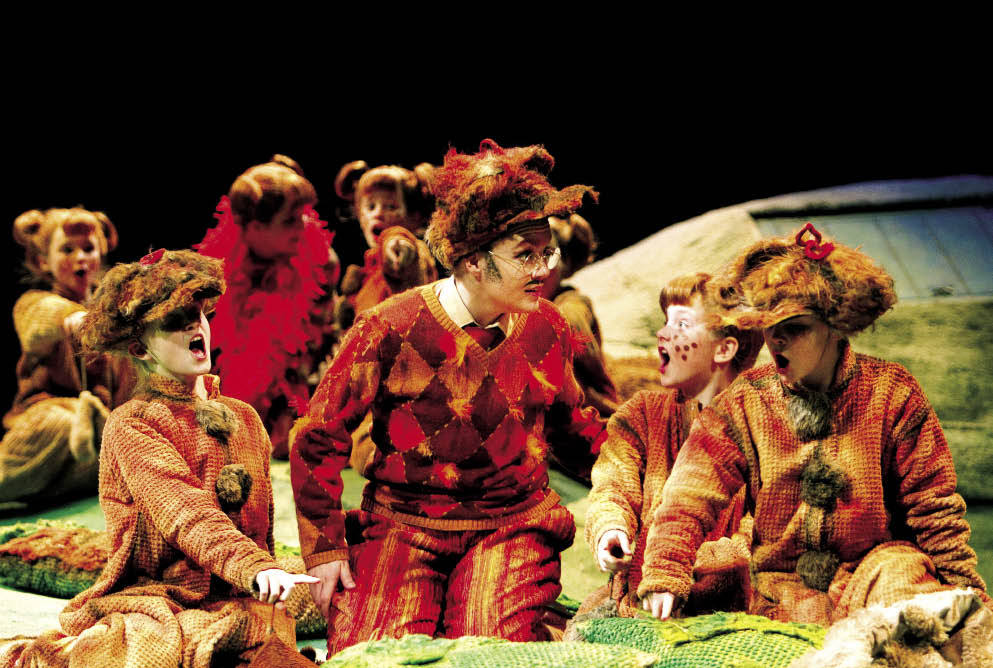The annual collaboration between Scottish Opera and the Royal Scottish Academy of Music and Drama is, as the principal of the RSAMD writes, ‘a model…for partnership working between professionals and professionals-in-training’, and it is hard to think of any work more suitable for this partnership than Janácek’s The Cunning Little Vixen.
The annual collaboration between Scottish Opera and the Royal Scottish Academy of Music and Drama is, as the principal of the RSAMD writes, ‘a model…for partnership working between professionals and professionals-in-training’, and it is hard to think of any work more suitable for this partnership than Janácek’s The Cunning Little Vixen.
The 76 players in the orchestra include 21 RSAMD students, and the singers are mainly young professionals, with several of the chief roles being double cast. A bit regretfully I saw the production in Edinburgh’s Festival Theatre, a cavernous and unappealing venue, presenting problems of orchestral balance which wouldn’t have arisen in Glasgow’s Theatre Royal. The translation is David Pountney’s well-tested version, as is the production itself, often seen at Scottish Opera and ENO. Pountney remains the arch-foe of surtitles, so naturally there were none here; and the result was that I failed to catch many of the words.
I had refreshed my memory of the work by watching the DVD of Felsenstein’s celebrated Berlin production of 1956, which put the opera on the international map, and so was able to make comparisons, few of them to the disadvantage of the Scottish production, though in Felsenstein’s very naturalistic version it is a treat to have so many close-ups. Of all Janácek’s operas this is the one that is most cinematic in technique, with characters coming into and out of focus often for just a line of dialogue. The venerable 1980 production, semi-naturalistic, now looks pretty moth-eaten, and was always functional rather than charming.
None of the mild snags prevented the evening from being intensely pleasurable, an almost complete success. The conductor Timothy Dean drew rich sounds from his orchestra, and not many acerbic ones, which would have been ideal. Anyone who was lucky enough to see the Royal Opera’s revival last March will remember it as possibly the supreme achievement of Sir Charles Mackerras, thanks above all to the comprehensiveness of his vision, as he managed to convey it to the orchestra and the singers.
The only trouble — for the reviewer — with a performance on that level is that it silences criticism, even possibly to the point of making one feel guilty about reflecting on the experience later, as opposed simply to savouring it. Whereas the Scottish production, admirable as it is, leaves room for thinking about the remarkable nature of this opera’s achievement, and its possible limitations.
In the present musical climate, any qualifications whatever that one might air about Janácek’s music, any of it, are treated with the deafening silence of contempt. He stands for, he embodies, clear-eyed generosity and warmth, and to raise questions is to reveal mean-spiritedness, an unwillingness to respond to such openness and acceptance. And even if reservations about some of his other works were allowed, how could one not go along with the glorious final minutes of Vixen, in which the Forester muses on the nature of Nature, the ever-recurring sequence of the seasons, and the other things which should lead one to nod in mute and awed agreement? This man will soon be going back to a wife who offers nothing of the joy and eroticism we have witnessed between the Vixen and the Fox, but that is part surely of the composer’s vision — such moments are bound to be short-lived.
Equally, the Vixen’s death a short time before, though the most dramatic moment in the opera, and surely with grim consequences for the Fox and the numerous cubs, is, instead of being underlined, something that yields directly to a passage of balmy music which could seem heartless if it weren’t so ravishing. And so on.
And yet…Janácek does make a contrast between the human world and the rest of Nature. The Forester, the Parson, the Schoolmaster are a disappointed trio, sitting round lamenting the way things have turned out. Of the humans, only the rascal Poacher seems happy, off to marry Terynka, the object of everyone’s desires, but unseen in the opera, a clever and evasive stroke. Reflectiveness, though it enables that final monologue, seems to be mainly a curse, hence the superiority of the non-humans, who live entirely in the present, knowing desire but not regret.
The very last lines of the opera suggest that individual deaths, and therefore lives, don’t matter, because a more or less identical replacement will soon come along. That’s a position that Westerners, at least, find hard to accept, and I don’t think that even Janácek did. But if he didn’t, and if we can’t, then the Forester’s affirmation needs scrutiny. Yet its music seems to forbid that.
The Forester I saw, Michel de Souza, was a fine, warm-toned, eloquent portrayal of the role. His non-human alter ego the Vixen, Natalie Montakhab, was as good, though slightly too aware of the cuteness of the role she was taking. Her partner, the Fox, though played by a woman, Elin Fflur Pritchard, was ideal, really almost the star of the show. Only the Schoolmaster was a miscasting, far too young and unbowed by life. Just the opera for a freezing urban night.






Comments